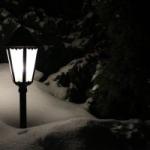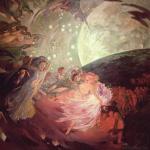 There is no agreement about a precise definition of the word “naturalism,” but I think the following captures the general idea: Naturalism is the idea that only natural principles and forces operate in the world, and these are the principles and forces that are studied by the physical sciences.
There is no agreement about a precise definition of the word “naturalism,” but I think the following captures the general idea: Naturalism is the idea that only natural principles and forces operate in the world, and these are the principles and forces that are studied by the physical sciences.
In common usage, the word “nature” is opposed to the word “artificial,” or “man made.” However, if natural principles and forces are all that effectively exists throughout space and time, then everything in the world, including humanity and human activity, is a part of Nature.
From the all-encompassing point of view, the distinction between natural and artificial, while notable, is not fundamental. For Naturalism, the center of Manhattan is as much a part of Nature as the middle of a Redwood forest; the thoughts running through my head are as much a part as birds flying through the sky. (In this piece, I use the capital “N” when using the word “nature” in this all-encompassing sense.)
Further, if natural principles and forces are all that exist, then Nature is both the creating and the created. Everything that exists arises from Natural process, is sustained through Natural process, and never departs from Natural process. Naturalism is thus thoroughly at odds with the traditional religious mythology of the West, which posits a separation between creator and creation and between the human mind and the rest of nature.
Dualism and Nondualism
The religions of the Orient, such as Taoism, Buddhism and Hinduism, are as filled with supernaturalism as those of the West (though as philosophies, Taoism and Buddhism are relatively free of the supernatural). But the mythologies of these religions do not emphasize a separation of creator and created, as do the mythologies of the West. For instance, the Tao of Taoism is a self-organizing principle completely immanent in the world.
There has been much written about similarities between Eastern religion and modern physics; most of it, I think, is of questionable value. But I do think that certain mythologies of the East, which emphasize the unity of the creating and the created, can provide interesting insights into the immanence that is implicit in Naturalism.
To consider the creating and the creation, and mind and matter, as aspects of one all-encompassing Nature, requires for many of us a radical change in how we think about the world. Western culture is rooted in a dualism that separates these and modern science arose in this culture. Even though the implications of Naturalism and the discoveries of modern science go against dualism, how we interpret these discoveries is influenced by our dualistic cultural roots. For all these reasons, this implication of Naturalism as an immanent, all-inclusive principle has remained somewhat hidden.
nature vs. Nature
But what about nature, with a small “n”? Does not the distinction between the natural and the artificial seem, well, like a natural one? I addressed this question in my previous post on SNS, Nature’s Creativity. There I wrote:
As we explore the world, then, we find three types of organization. If we call organization without a plan “self-organization,” perhaps we might call organization with a plan “algorithmic organization” (at least that is the term that I have coined for it). We can then divide algorithmic organization into two types, based on whether the plan is intrinsic to the set of elements being organized, as it is in an organism, or extrinsic, as it is in a machine or other human artifact.
From the point of view of organization, those forms of organization created by means of what I call “extrinsic algorithmic organization” are what we mean by “artificial,” whereas “natural” things arise from the other two forms of organization. Because artificial things can appear very suddenly and out of context with the existing natural environment, they are often damaging to that environment. Yet Nature provided us with the ability to plan and develop novel artifacts. Our ability to create in this way is an extension of Nature’s creativity even when its use is damaging to nature. So the distinction between natural and artificial is meaningful. It represents a juncture where out of Nature a new form of organization emerged. But this distinction is not a fundamental difference between two realms of being, such as dualism would have it, but between two forms of organization within one, all-encompassing Nature.
The Human Self
In certain interpretations of Western Naturalism, the human self is pictured as a tiny entity existing in an unthinkably large and alien universe. For Naturalism understood nondually, however, the self is as expansive as the universe. The elements that comprise our body were forged in giant stars more than four billion years ago. The genes that structure our body and drive our physiology have evolved over more than a billion years; we share the vast majority of them with other living organisms. The electromagnetic energy that propels our body has its origin in the sun’s nuclear fusion. The languages and ideas that course through our minds evolved in cultures long since lost and civilizations we only know as archaeological ruins.
There is no piece of our body or mind that is independent of the great cosmological processes of the galaxy; the biological, geological and climatic processes of the earth; or the long history of our uniquely human cultural evolution. I would suggest that the idea of our being a tiny actually-existing self in a huge universe is a carryover from our dualistic heritage. For an all-inclusive Naturalism, we are “part and parcel of everything,” to use Emerson’s phrase.
From this point of view, the human self is all otherness — the otherness of these great physical and cultural processes. Note the two parts of this phrase: 1) the human self is; and 2) what it is is otherness. The self is characterized by this fundamental ambiguity. We are, but the self is not a thing in itself, but an ever changing, yet enduring process. Because this process is enduring and has continuity we can put together an autobiography, we can tell the story of our life. But to write a really complete autobiography, one would have to include reference to the great natural processes in which the small process of our life was engendered and is sustained.
To experience our being as “part and parcel of everything,” is to experience our self as Nature. In the various traditions of nonduality, the equivalent experience is expressed as being one with Tao or God or other such terms. The main point I wish to present in this article is that when we understand Nature as the all-encompassing, it means that Naturalism offers the same possibilities of experience as the great spiritual traditions. Our ideas and words are different, but the experience is the same. This experience, along with the deepening of our understanding of the world that can accompany it, is Naturalistic spirituality’s equivalent of “the pearl of great price.”
Learn about Membership in the Spiritual Naturalist Society
__________
The Spiritual Naturalist Society works to spread awareness of spiritual naturalism as a way of life, develop its thought and practice, and help bring together like-minded practitioners in fellowship.













